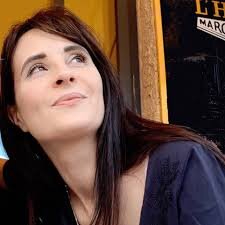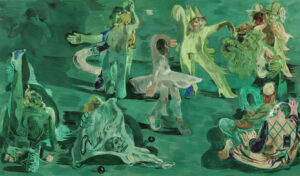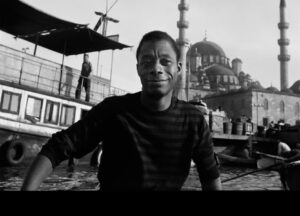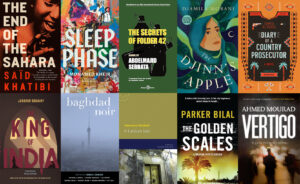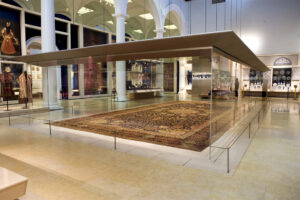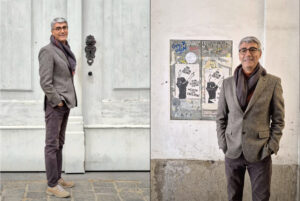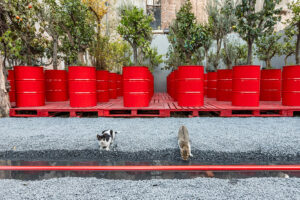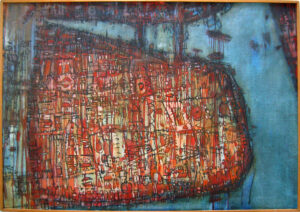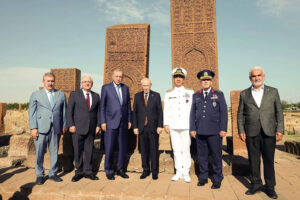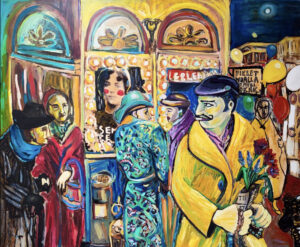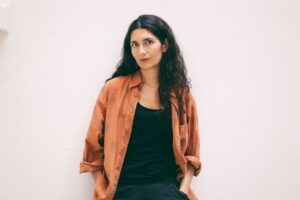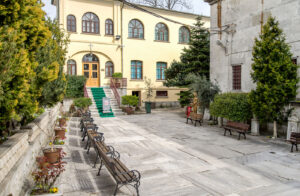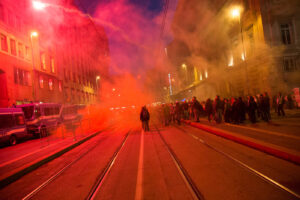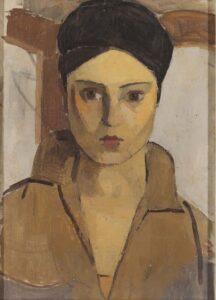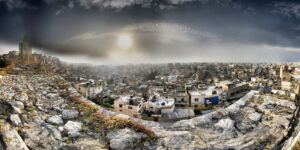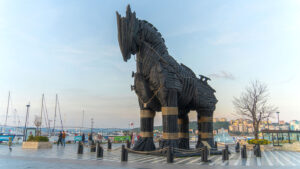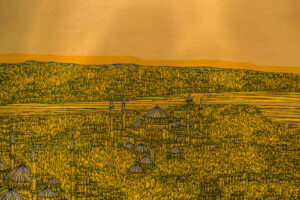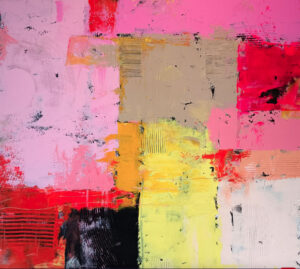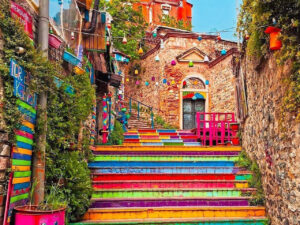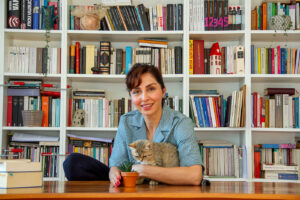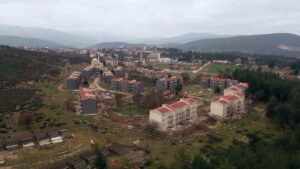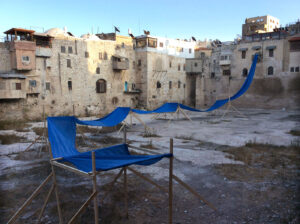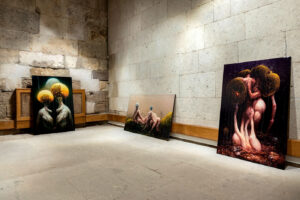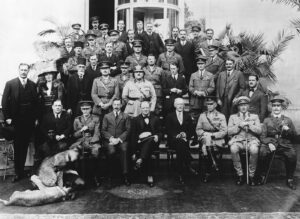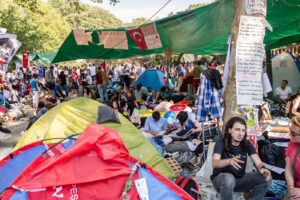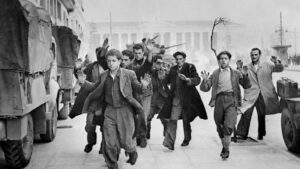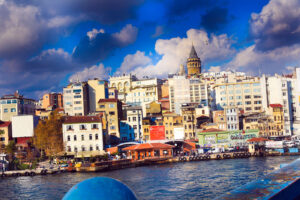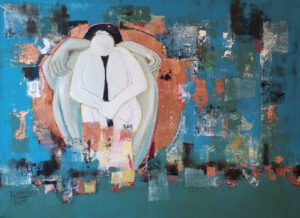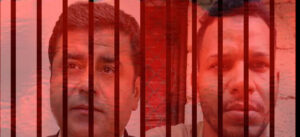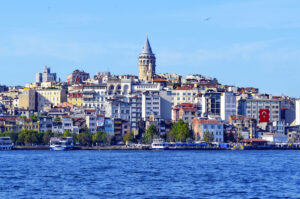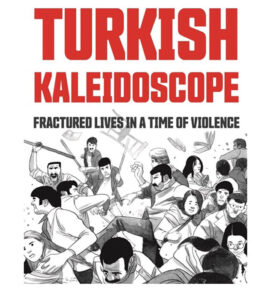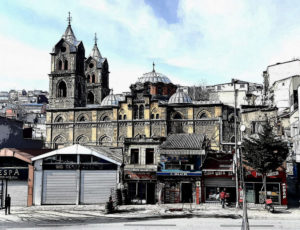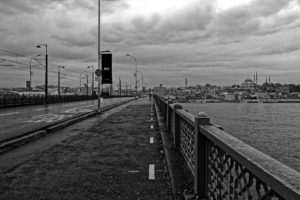
“Gold in Taksim Square” is a translated extract from Nektaria Anastasiadou’s new Greek novel: the story of Athena Arzuhaltzi, a single woman reflecting on life, dishing out witty advice, and reimagining her future. Born in 1940s Istanbul, Athena lived through the 1955 pogrom, various engagements and affairs, the expulsions of thousands of members of her Rum Orthodox community in the 1960s, the death of her parents, childlessness, and a handful of juntas.
She now lives alone in an Istanbul building that was once inhabited by Christian and Jewish families and is now occupied by rented offices. It’s 2016, the year that Athena promised, forty years prior, to meet at the Patisserie Markiz with Rafael, an old lover from whom she has not heard since. While attempting to find traces of Rafael on social media with the help of Nina, a Greek architect who works in her building, Athena repeatedly quarrels with her Jewish neighbor Rita. As the meeting with Rafael approaches, Athena is faced with a choice: reevaluate her antisemitic tendencies or lose her younger friend Nina.
Scenes of past and present Istanbul are infused with musings on food, aging, loneliness, and love, as well as visits from the ghost of Athena’s dead father. The novel is a nuanced and humorous story of friendship, the portrait of a stubborn woman attempting to break free from tired prejudices, and a love letter to Istanbul and single people everywhere.
Nektaria Anastasidou
Once upon a time a Kurd from a faraway village in the East heard that the roads of Istanbul were paved in gold. He sold his cows and sheep and hid in a cart on its way to the City. The morning of his first day here, he found a gold sovereign in a muddy street. “Am I going to start collecting them already, before I’ve even had a look at the place?” he said, kicking the sovereign. “I’ll have holes in my pockets in no time!” Of course, he never again saw a gold sovereign in his life.
Something similar happened to me when I was seventeen and fresh as the fragrant grass surrounding the Republic Monument in Taksim Square. It was an afternoon in June 1961, the last day of classes at Notre Dame de Sion. As soon as I entered the house, my father Avraam took my school bag, put money in my hand, and said, “Go get us a box of mastic lokumia, Athena.”
My father had never before sent me on an errand. When I was nine, Madame Olga from the flat opposite ours asked me to go to the green grocer for potatoes. My father found me crying in the street outside the shop, for I had no idea how to choose potatoes and I was ashamed to ask for help. He took me home, knocked on Olga’s door and said, “Nobody sends my daughter out alone, Madame Olga, nobody! To think, a bite-sized girl all by herself with a sack of potatoes that she can’t even carry!” That was Avraam, always ready to protect me, as if he had a truncheon in hand.
And so, when he sent me to buy bite-sized sweets in June 1961, it meant that I was no longer a bite-sized girl. I bought a box of mastic-flavored lokumia from Hacı Bekir in the Grand Avenue and then, instead of going home, decided to take a walk to celebrate summer insouciance and my new status. Wearing the smile that my father had forbidden when I was unaccompanied, I strolled into Taksim Square and lifted my gaze to the bronze statue of Atatürk, who, dressed like a film star in a suit and trench coat, gazed eternally toward the dome of Holy Trinity. His left fist, coquettishly placed on his hip, held a pair of gloves; his right palm was opened toward the church, as if he were saying “Now that’s nobility.” Behind the figure of Atatürk stood İsmet İnönü, the statesman who never liked us Rums; and behind İnönü stood two mysterious Russian generals, envoys of Lenin.
While I was considering the statue and thinking what a fine fellow our blue-eyed Mustafa Kemal Paşa was, I suddenly heard my name in Turkish: “Atina! Wait for me if you don’t mind!”
I turned and beheld Fikret Aslanoğlu, the son of a highly regarded family that lived in Hayırlı Palas, an aristocratic apartment building near our own. Ten years before, Fikret’s doctor father had picked me up when I fell off my bicycle in the park. Dr. Aslanoğlu, wearing a fine suit that felt like silk beneath my fingers, had examined the bruise on my arm and said to me in a voice as comforting as sage tea, “Did you know, Atina, that we grow up only when we fall?”
Plenty of Greeks consider the Turks barbarians who “learned everything from us.” But that’s not the way it is. There are Ottomans so refined that they still smell of rose water and cloves, as if they left their palaces only five minutes before. The Aslanoğlus were such a family, eminent — and I use that word literally, not because I am obliged to do so according to protocol, as the Greeks do with their bishops.
I digress. We return to 1961.
If you have the great luck to find gold — wherever it is, in whatever form, and whenever — put it straight into your pocket and forget all the cities that you’ve seen looted, stained, and desecrated.
Fikret took a frightened breath and said, “I would like to speak with you.”
Both his elegance and his use of the formal you impressed me. We hadn’t spoken before, but we were children of the same neighborhood. The informal would have been fine, that is, but Fikret stuck to the respectful plural. I closed my eyes to the sun — I’d forgotten a hat — and said, “I’m listening.”
Fikret must have understood that the light bothered my eyes because he said, “The sun is burning you. Come this way.” Without touching me, he led me into the shade of the black locusts — trimmed like upside-down mops — that surrounded the monument. Perhaps he needed the shade as much as I did, because his forehead was beaded with sweat. “I’ve seen you many times,” he said. “Although I’m just beginning university … to become a doctor like my father…”
While waiting for Fikret to finish his sentence, I discreetly observed him: his worn but freshly shined shoes, his thin but well-trimmed mustache, the pimples around his mouth, which could also have been swollen shaving cuts.
“I like you,” he said finally, “and I would like to marry you.”
I took a deep breath. He smelled of Arab soap, lemon cologne, and man. If I said yes, I would smell him every morning. I imagined us, for a few seconds, walking behind a buggy with our first baby. I imagined myself without fear, since no one would bother me if I had a Muslim husband. I looked at Atatürk and the Russian generals, then at Fikret with his big brown eyes, full of hope. He was only eighteen, but he stood before me in a noble way, without flirtation and silliness — a naked soul, exposed. I liked him. I wanted to say yes.
And here, you must permit me another digression so that I can explain why I didn’t say what I had in my heart. On the evening of September 6th, 1955, we closed up our summer house on Büyükada island, passed a pleasant hour on the steamboat, and debarked in Galata without knowing that a pogrom was going on in all the Rum neighborhoods of the City. There was so much noise in the harbor — shouting, smashing of glass and wood — that my father said to mama, “Woman, the Russians are invading the City.” I was eleven years old then, and I believed that we were indeed having a Russian invasion.
We took a taxi from Galata to Kabataş, and from there we tried to ascend the hill to our building on foot. The way, however, was blocked by crowds, and the pandemonium coming from the Grand Avenue was even more frightening than that of Galata. It was impossible to reach our building. We knocked at the door of the merchant Pericles Athanasiadis in lower Gümüşsuyu. As soon as we entered his flat on the sixth floor, my father said, “I’m with the wife and children, Pericles, and I don’t know what to do.” This sentence frightened me more than the Russians and the invasion. It was the first time ever that my father didn’t know what to do.
We slept in the living room of Mister Pericles, with a view of the Bosporus and the flames burning the Rum churches on the Asian side. Seven churches to be exact. I counted them. The Russians burned seven of our churches. In my heart, I despised the murderers of the Romanov family … until I learned, the following day, that we weren’t having a Russian invasion at all. The perpetrators, mostly criminals and villagers, but also some of our neighbors, were the others. They burned our churches, destroyed Rum shops, and opened holes in our hearts. After a numb breakfast, we left Mister Pericles’s flat and walked home through streets covered with papers, pastries, cloth, flour, and cast-off shoes, pressed down on the heel caps; the pogromists had abandoned them after looting new shoes from Rum stores. Muslim neighbors offered to hide us in their houses, but my father wouldn’t listen. He said, “We will live or die in our own home.” As soon as we made it to our flat, he locked the door, filled his hunting rifle with bullets, and slept in the armchair of the foyer, waiting for an attack that never came.
I won’t tell you that our opinion of families like the Aslanoğlus — who didn’t have anything to do with those events — changed in 1955. But even before the pogrom it wasn’t easy for a Rum family to accept an Ottoman son-in-law; after the September 1955 events, however, things became even more difficult. The pogromists smashed all the porcelain in our shop and stole the silver. My father had to resurrect his business from ashes at the age of fifty-one. The girls at my school, when someone mentioned the September pogrom, would say “mama told us not to speak of those events.” That’s how afraid we were. So it wasn’t possible for me to speak to my father about Fikret, however golden-hearted the boy was. I had to cut the subject at the root.
With a tight knot in my chest, I said, “Thank you, Fikret, but I’m still a student. My school doesn’t allow us to become engaged.”
“I’ll wait for you,” he said.
Wait, I wanted to say. Wait.
Out loud I said, “I’m sorry, but I haven’t yet thought of marriage.”
“Would you like time to think about it?”
If I thought about it, my family would cut me into thin slices like pastirma.
“No,” I said. “Thank you.”
Fikret lowered his gaze. “Forgive me. I disturbed you.” He said goodbye and left. I remember the back of his corduroy sport jacket, which seemed too warm for that summer weather. Perhaps he needed it to face my coolness. I wanted to call him back. Instead, I remained silent beneath the shade of the pruned black locust. Part of me may still be standing beneath that tree, despite the fact that it was cut down and burnt decades ago. There is no lost opportunity that I regret more than Fikret’s proposal, the most plainspoken, pure gesture that I received in my entire life. He was only eighteen, but honorable and brave — truncheon in hand, just like my father Avraam.
Fifty-five years have passed. There’s nothing I can do to turn back time and change that mistake. But you, dear, can take the lesson. You must be just as ready with your yes as you are with your no. No road is paved with gold sovereigns. If you have the great luck to find gold — wherever it is, in whatever form, and whenever — put it straight into your pocket and forget all the cities that you’ve seen looted, stained, and desecrated.



